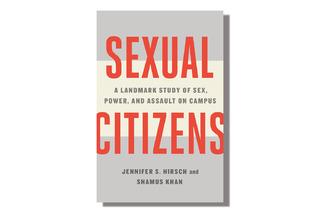CW: This article references sexual assault. Please refer to the end of the article for on- and off-campus resources.
Sexual assault can be the result of campus policies, and education must improve to combat the issue, panelists said at a Sept. 27 event.
At the event, titled “Sexual Citizens: A Landmark Study of Sex, Power, and Assault on Campus,” panelists discussed sexual assault on college campuses and the ways education can improve to combat the issue. The event was co-hosted by the Georgetown University Gender+ Justice Initiative, Women’s Center, Georgetown College, Women’s and Gender Studies Program, Title IX Office and Student Health Services.
University policies related to student safety that are unequally applied across identity groups can create environments that facilitate sexual assault, according to Jennifer Hirsch, a professor and deputy chair for doctoral studies in socio-medical sciences at Columbia University and co-author of the 2020 book “Sexual Citizens: A Landmark Study of Sex, Power, and Assault on Campus.”

“There’s so many ways in which the environment that we’ve built on campus amplifies power inequalities instead of mitigating them,” Hirsch said at the event. “Policy decisions like the fact that fraternities but not sororities serve alcohol or that it’s very hard for first-year students to host parties because most of them are under the drinking age and so their social spaces tend to be more heavily policed.”
One of the root causes of sexual assault on college campuses is a lack of adequate sexual education, according to Hirsch.
“We erase young people’s sexual citizenship by forcing them to come of age in a climate of silence and fear, which doesn’t enable them to do what they want to do without hurting other people,” Hirsch said. “So really, we shouldn’t be so surprised that there’s so much sexual violence because we as a society are choosing not to do better there.”
Sexual assault is pervasive on college campuses. Among undergraduate students, 26.4% of females and 6.8% of males experience either rape or sexual assault, according to a 2020 Association of American Universities report.
Sexual education at all education levels should be more comprehensive, and especially should cover important concepts such as consent, according to Hirsch.
“Our goal really should be teaching people not to assault other people, not helping women fend off unwanted advances,” Hirsch said. “And so sex education could really do that if it started in an age-appropriate way in kindergarten, which is basically telling little kids not to put their hands in other people’s bodies when when they’re not wanted.”
Currently, 24 states and the District of Columbia mandate sex education. Decisions about sex education, however, are made at the state and local level, which may result in a great discrepancy in sex education among individual school districts.
Sexual education should also center around LGBTQ individuals and address power imbalances between different identity groups, according to Shamus Khan, professor of sociology and American studies at Princeton University and co-author of “Sexual Citizens.”
“Sex ed needs to center the experiences of queer people not abstractly, but particularistically — that is, to highlight what those experiences are,” Khan said at the event. “Just as it needs to highlight racial differences, class differences, age differences, as part of its overall education in power.”
LGBTQ students in the United States have reported negative experience with sexual education; in 2013, the Gay, Lesbian and Straight Education Network published a report stating that fewer than 5% of LGBTQ students had positive experiences with LGBTQ representation in their health classes. Furthermore, there are seven states that prohibit sex educators from discussing LGBTQ-related topics in health classes.
Community groups of all kinds have a responsibility to take a stand against sexual assault, according to Hirsch.
“Part of the reason that higher education has failed for decades to reduce rates of sexual assault is that it’s been regarded as a campus problem, and in ‘Sexual Citizens’ we redefine it and show how it’s an everyone problem,” Hirsch said. “Schools and families and religious organizations, every institution that touches young people on their way to adulthood needs to get on board and be part of the solution.”
Progress on sex education is occuring at the state level, and individuals should pressure their elected officials to improve sex education in schools, Hirsch said.
“All of you who care about this, turn your eyes away from Washington and call your state legislatures,” Hirsch said.
Resources: On-campus resources include Health Education Services (202-687-8949) and Counseling and Psychiatric Service (202-687-6985); additional off-campus resources include the D.C. Rape Crisis Center (202-333-7273) and the D.C. Forensic Nurse Examiner Washington Hospital Center (844-443-5732). If you or anyone you know would like to receive a sexual assault forensic examination or other medical care — including emergency contraception — call the Network for Victim Recovery of D.C. (202-742-1727). To report sexual misconduct, you can contact Georgetown’s Title IX coordinator (202-687-9183) or file an online report here. Emergency contraception is available at the CVS located at 1403 Wisconsin Ave NW and through H*yas for Choice. For more information, visit sexualassault.georgetown.edu.





















